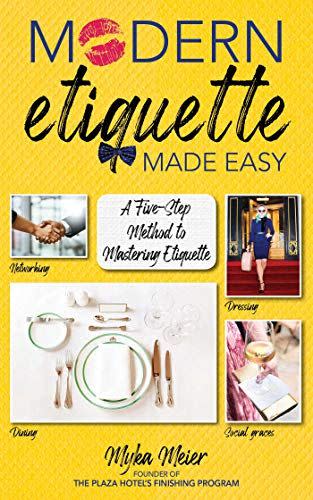How to Maintain Civility During the Holidays, According to Modern Etiquette Expert Myka Meier

"Hearst Magazines and Yahoo may earn commission or revenue on some items through these links."
The holiday season is just around the corner, and while we certainly could use a break, the thought of extended time with loved ones—and celebrating during a pandemic—can conjure not just joy and excitement, but anxiety.
We're not just talking about getting ready for guests, who may be staying a little longer this year. (Because, let's face it, prep work for hosting is part of the fun, especially when it involves stocking your party closet.) What truly triggers feelings of uneasiness is fear and confusion about how to navigate conversation with loved ones with whom we disagree—especially on the heels of a contentious presidential election.
To quell our own apprehension, we turned to best-selling author and etiquette expert Myka Meier of Beaumont Etiquette and its Plaza Finishing Program, known for coaching adults, teens, and children through etiquette-driven self-transformation via her signature five-step method: transform, attract, empower, thrive, and practice.


Modern Etiquette Made Easy: A Five-Step Method to Mastering Etiquette
amazon.com
$11.59
AmazonAs Meier reminds us in the intro to her best-selling book, Modern Etiquette Made Easy, etiquette encompasses way more than knowing how to sit up straight or which fork goes with which course. It's actually "this fabulous way of conducting yourself to show respect, consideration, and kindness to those around you. It's putting everyone and all living things before yourself. It's about practicing social and emotional intelligence, or EQ [emotional quotient]. The bonus is the polishing part," she says.
Below, Meier's thoughtful, straightforward answers to our biggest questions about how to keep our cool and make others feel more comfortable under any holiday circumstance.
How do I show my love for family members with whom I have serious political differences? If the thought of spending time with them makes me nervous, but the thought of avoiding them makes me sad, what do I do?
It’s important to remember that etiquette is all about showing kindness, consideration, and respect to everyone around us. Let that guide your actions and reactions, and you’re sure to navigate tricky situations with grace.
You shouldn’t have to miss out on a family event because you fear conflicting opinions, and instead should just come prepared with a few good tactics to make sure conversation flows smoothly and without friction. Remember, you may not agree with or even respect your family or friends’ opinions, but I think it’s important to respect the fact that everyone has the right to their own opinion.
It may even be important for you to set boundaries ahead of seeing one another. If you are a guest at a family event where someone brings politics up and you do not want to engage in discussion, you can simply say, “I think we will just need to agree to disagree on this topic. Why don’t we talk about something we all can agree on…what about how amazing this meal is? Or how great the Titans are doing this year?”
You could also use a direct approach by saying, “Aunt Ruth, I love you so much that I am consciously not going to chat politics with you because I know we don’t see eye-to-eye on a few things, and that’s okay! I love you, let’s cheers to health, family, and to a happy Thanksgiving.”
What if someone asks me how I voted, or how I feel about the election outcome?
Even if someone outright asks you a question, you don’t have to answer. Voting can be a very private and personal decision, and it’s up to you if you wish to share details about who you voted for or even your political affiliation.
If you wish not to share who you voted for or your thoughts on the election outcome and someone asks you, it’s fine to say back in a respectful manner something like, “I tend to keep my political opinions to myself” or even add a little humor to a tense situation, but only if it feels appropriate: “I did vote; however, I never talk politics. That’s how I’ve kept all my friends over the years!”
What if someone I care about makes an inappropriate joke—or makes what he/she thinks is a joke but it hurts my feelings? Should I say something or change the subject? And, if I want to say something, how can I do so without being, or appearing, combative?
If you are in a discussion when someone makes a hurtful joke, ignoring it may imply you agree. I therefore think you should address it in a calm and non-combative tone: “Sam, while we’re together I’d rather not hear any more about XYZ, as this could be hurtful to some, and I just want everyone to have a nice time.” Then, once you have addressed it, you can change the subject. If the person continues or turns hostile, remove yourself physically from the room. It’s pretty hard to argue with that.
If you are in a conversation that is heading toward conflict, pending the person or situation, you may choose to address it head-on by saying, “It’s clear we won’t be able to see eye-to-eye on this one, so let's agree to disagree and talk about something else.” If you already know you don’t see eye-to-eye on a topic, it’s okay to say upfront, “Let's make a no-politics rule for the next hour so we can just enjoy lunch together.”
Is it ever okay to lay out a rule (i.e. no political talk, please!) in advance of a gathering, or is it less acceptable to try to "police" conversation among family and friends?
If you are the host, it’s actually one of your jobs to moderate group conversation and make sure not only that it’s flowing and everyone is included, but that the environment is not hostile or uncomfortable for any of your guests. Guests should all feel happy and welcome, and it may be one of the harder duties of a host or hostess to politely step in when needed to change the conversation.
If done in a respectful way, or even using a little humor, it’s okay to set boundaries and tell guests ahead of the meal that the dinner party is to celebrate friends and family coming together and not for political talk on this particular day. Guests should always respect the wishes of a host.
You Might Also Like

